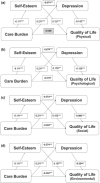Quality of life and care burden among family caregivers of people with severe mental illness: mediating effects of self-esteem and psychological distress
- PMID: 36316688
- PMCID: PMC9624032
- DOI: 10.1186/s12888-022-04289-0
Quality of life and care burden among family caregivers of people with severe mental illness: mediating effects of self-esteem and psychological distress
Abstract
Background: Family caregivers are important allies for healthcare providers in facilitating the recovery process among people with mental illness (PWMI). The present study examined the factors associated with quality of life (QoL) among family caregivers of PWMI.
Methods: A multi-center cross-sectional survey was conducted. Family caregivers of people with schizophrenia, major depressive disorder, and bipolar disorder were recruited using convenience sampling. A survey assessing their QoL, depression, anxiety, and self-esteem was completed with self-rated psychometric scales including the Rosenberg Self-Esteem Scale, Caregiver Burden Inventory, Taiwanese Depression Questionnaire, Beck Anxiety Inventory, and World Health Organization Quality of Life Instrument Short Form. A mediation model was constructed with QoL as the dependent variable, care burden as the independent variable, and psychological distress (including depression and anxiety) with self-esteem as mediating variables.
Results: Family caregivers of people with schizophrenia had worse QoL compared with counterparts of people with major depression and bipolar disorder. The sociodemographic of both caregivers and PWMI had less impact on QoL when psychological factors were considered. Caregivers with lower self-esteem, higher levels of psychological distress, and heavier care burdens had poorer QoL. Care burden had a significant total effect on QoL. Both self-esteem and psychological distress were significant mediators.
Conclusion: The findings indicated that caregivers' psychological health and care burden influenced their QoL. Interventions that target family caregivers' self-esteem and psychological distress may attenuate the effect from care burden, and further improve their QoL.
Keywords: Bipolar disorder; Care burden; Family caregiver; Major depressive disorder; Quality of life; Schizophrenia; Self-esteem.
© 2022. The Author(s).
Conflict of interest statement
The authors all reported no known financial interests or conflicts of interest in this research.
Figures




References
-
- Sadock BJ, Sadock VA, Ruiz P. Kaplan & Sadock’s synopsis of psychiatry: Behavioral sciences/clinical psychiatry. 11. Philadelphia: Wolters Kluwer; 2015.
-
- Hill H, Killaspy H, Ramachandran P, Ng RMK, Bulman N, Harvey C. A structured review of psychiatric rehabilitation for individuals living with severe mental illness within three regions of the Asia-Pacific: Implications for practice and policy. Asia Pac Psychiatry. 10.1111/appy.12349. - PubMed
Publication types
MeSH terms
LinkOut - more resources
Full Text Sources
Medical

